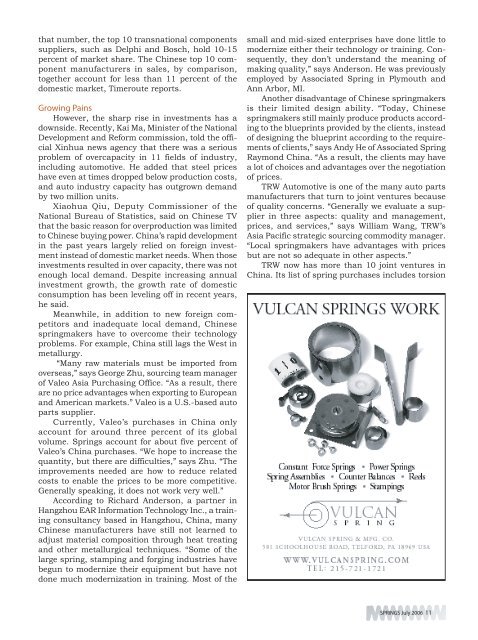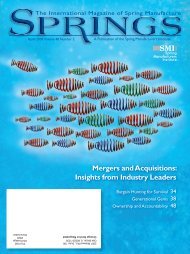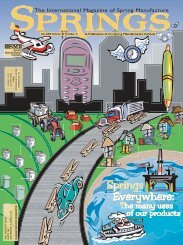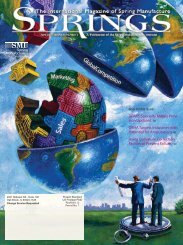Solid Height - Spring Manufacturers Institute
Solid Height - Spring Manufacturers Institute
Solid Height - Spring Manufacturers Institute
You also want an ePaper? Increase the reach of your titles
YUMPU automatically turns print PDFs into web optimized ePapers that Google loves.
that number, the top 10 transnational components<br />
suppliers, such as Delphi and Bosch, hold 10-15<br />
percent of market share. The Chinese top 10 component<br />
manufacturers in sales, by comparison,<br />
together account for less than 11 percent of the<br />
domestic market, Timeroute reports.<br />
Growing Pains<br />
However, the sharp rise in investments has a<br />
downside. Recently, Kai Ma, Minister of the National<br />
Development and Reform commission, told the official<br />
Xinhua news agency that there was a serious<br />
problem of overcapacity in 11 fields of industry,<br />
including automotive. He added that steel prices<br />
have even at times dropped below production costs,<br />
and auto industry capacity has outgrown demand<br />
by two million units.<br />
Xiaohua Qiu, Deputy Commissioner of the<br />
National Bureau of Statistics, said on Chinese TV<br />
that the basic reason for overproduction was limited<br />
to Chinese buying power. China’s rapid development<br />
in the past years largely relied on foreign investment<br />
instead of domestic market needs. When those<br />
investments resulted in over capacity, there was not<br />
enough local demand. Despite increasing annual<br />
investment growth, the growth rate of domestic<br />
consumption has been leveling off in recent years,<br />
he said.<br />
Meanwhile, in addition to new foreign competitors<br />
and inadequate local demand, Chinese<br />
springmakers have to overcome their technology<br />
problems. For example, China still lags the West in<br />
metallurgy.<br />
“Many raw materials must be imported from<br />
overseas,” says George Zhu, sourcing team manager<br />
of Valeo Asia Purchasing Office. “As a result, there<br />
are no price advantages when exporting to European<br />
and American markets.” Valeo is a U.S.-based auto<br />
parts supplier.<br />
Currently, Valeo’s purchases in China only<br />
account for around three percent of its global<br />
volume. <strong>Spring</strong>s account for about five percent of<br />
Valeo’s China purchases. “We hope to increase the<br />
quantity, but there are difficulties,” says Zhu. “The<br />
improvements needed are how to reduce related<br />
costs to enable the prices to be more competitive.<br />
Generally speaking, it does not work very well.”<br />
According to Richard Anderson, a partner in<br />
Hangzhou EAR Information Technology Inc., a training<br />
consultancy based in Hangzhou, China, many<br />
Chinese manufacturers have still not learned to<br />
adjust material composition through heat treating<br />
and other metallurgical techniques. “Some of the<br />
large spring, stamping and forging industries have<br />
begun to modernize their equipment but have not<br />
done much modernization in training. Most of the<br />
small and mid-sized enterprises have done little to<br />
modernize either their technology or training. Consequently,<br />
they don’t understand the meaning of<br />
making quality,” says Anderson. He was previously<br />
employed by Associated <strong>Spring</strong> in Plymouth and<br />
Ann Arbor, MI.<br />
Another disadvantage of Chinese springmakers<br />
is their limited design ability. “Today, Chinese<br />
springmakers still mainly produce products according<br />
to the blueprints provided by the clients, instead<br />
of designing the blueprint according to the requirements<br />
of clients,” says Andy He of Associated <strong>Spring</strong><br />
Raymond China. “As a result, the clients may have<br />
a lot of choices and advantages over the negotiation<br />
of prices.<br />
TRW Automotive is one of the many auto parts<br />
manufacturers that turn to joint ventures because<br />
of quality concerns. “Generally we evaluate a supplier<br />
in three aspects: quality and management,<br />
prices, and services,” says William Wang, TRW’s<br />
Asia Pacific strategic sourcing commodity manager.<br />
“Local springmakers have advantages with prices<br />
but are not so adequate in other aspects.”<br />
TRW now has more than 10 joint ventures in<br />
China. Its list of spring purchases includes torsion<br />
SPRINGS July 2006 11





